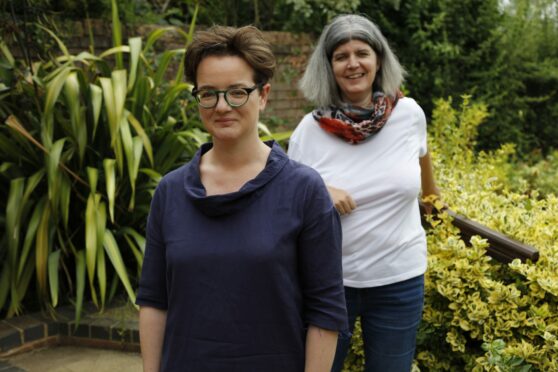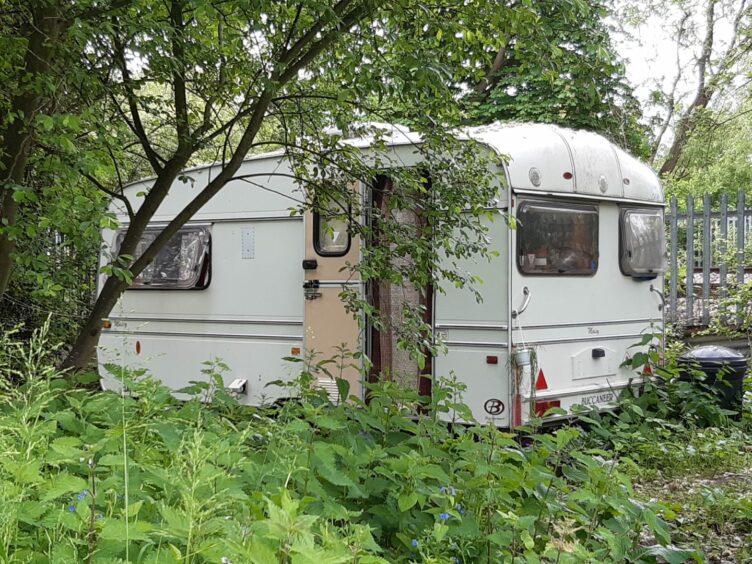
From her childhood in the Scottish Borders to a log cabin in Greenland, from a converted baroque palace nestled on the River Regnitz to an apartment in Manhattan, Nancy Campbell has lived around the world but never felt at home.
Then, in the wake of lockdown, after one of the most difficult periods of her life, the 44-year-old finally settled – in a secondhand caravan on a strip of neglected woodland between the canal and railway lines just outside of Oxford.
The decision to buy and live in her “wild card” home came after Campbell had spent a year caring for her now former partner, Anna, who had suffered a stroke and had been hospitalised just as the pandemic began. The couple had been thinking of their uncertain future, a possible separation, but faced with hospital appointments, recovery and a pandemic shutting down access to outside help, vowed to stay.
“It was very overwhelming to be faced with the situation of caring for someone with major health conditions and with no medical experience myself,” explained Campbell from the garden she hand-planted outside her caravan home, the sound of trains passing nearby. “It’s quite frightening dealing with someone who has a brain injury. There’s always fear they might have another stroke, and many have lability, which means their emotions are very up and down.
“It’s a horrible experience to suddenly find yourself in a harder place in life but in addition to that there’s a lot of weeping and anger and different emotions. It was such a new and daunting situation for me to be in but the fact that everyone was undergoing something really strange and surreal, in some ways, made it easier. It made me feel that there was some solidarity there. That there was a weirdness in the world outside that reflected the weirdness of my situation.”
As her former partner slowly recovered it became time for Campbell, too, to start rebuilding her life and through what she described as “very weird different coincidences” she found, purchased and relocated to an old caravan, joining a small community of people surrounded by nature.
As she dug up weeds, bagging rubbish and debris, and learned to care for her new, somewhat unconventional home, her sadness began to lift.
“Having travelled a lot for work and then worked for a year in Germany just before lockdown, I had a sense of wanting to put down roots so that I could explore something deeper,” she explained of the move.
“I had become quite adept at moving into new houses – a little baker’s shed in Greenland, water palaces in Bavaria – so I was able to roll up anywhere I was given, meet new people very quickly and forge connections. Although the caravan idea was a bit of a wild card in the various safe options I could have gone for, I’m very relieved that I stayed in Oxford. It was very positive.”
It was during this time, from the summer of last year, that Campbell, an award-winning poet and writer, started keeping journals to explore her thoughts and feelings. At the same time, she was reading acclaimed film director Derek Jarman’s own collection of diaries, Smiling In Slow Motion, and realised her journey – from relationship to friendship, abandoned waste ground to thriving home – had a narrative that might help others. Her personal notes, diary entries and musings quickly morphed into a memoir, Thunderstone, published earlier this month. Raw, honest and moving, her story of “losing one home and discovering another” tracks Campbell’s summer of self-discovery and recovery.
“I was just writing a journal because I had this exciting new project of the caravan, and it was very much just for myself,” explained Campbell, whose previous non-fiction books include Fifty Words For Snow, published last year. “It was only halfway through the summer that the idea of it taking shape as a narrative for others to read just sort of popped into my brain – maybe my notes would strike a chord with some readers, too.
“I’m quite a private person, generally, not an enormous extrovert. But in the process of caring for Anna in lockdown, many things changed – changed me, and made me less cautious, maybe. Being with someone with aphasia, someone who is discovering how to speak again, in some ways also changed my own voice, my writing voice, too.”
The memoir takes its name from the thunderstone, a small fossil of a sea urchin, baring the mark of a five-pointed star, which Campbell found many years ago on the shores of the Limfjord Channel in Denmark.
The belief that the stone had been hit by lightning, rather than formed from a sea creature, led people to traditionally place thunderstones in the corners of their home, protecting their family from lighting strikes.
For Campbell, it was the perfect metaphor for her life that had been struck and changed. She explained: “The sea urchins used to bury down in the silt, and that’s why the fossils are quite common – because they buried themselves. I liked the sense that I had this object with me that was protective but also had a sense of deep time.
“I had been living very much in the moment during lockdown, in that quite traumatised state of not being able to see your way out of a situation. The sense of this creature that was so ancient gave me hope for the future.”
While Thunderstone centres around how a “wasteland burgeoned into a place of wild beauty”, it is also partly the story of caring for someone after a life-changing medical emergency – which Campbell hopes will give readers a new perspective on being forced from one life into another.
“When someone has a stroke quite young – Anna was 46 – you often associate it with quite a geriatric illness. It can be very frightening, especially when you see people in hospitals for the first time, and you’re not sure what recovery will be like, what life will be like,” said Campbell. “You only know it’s going to be different. It will be really nice if Thunderstone could bring that experience to discussion, showing people the process of recovering from stroke – and the fact that there is the chance of recovery. It may be extremely slow and maybe with partial life changes but Anna’s story is certainly hopeful.
“Building a changed relationship with Anna – rather than running away in fear – has been immensely challenging and took a lot of courage. But I’m so pleased it has been possible because I can support her and she supports me, too.
“I hope people can also take away the importance of caring for yourself and your surroundings. If my story being out there reassures some people or gives them just a mirror to reflects on, that will make me very happy.”
Thunderstone: A True Story Of Losing One Home And Discovering Another, £14.99, Elliot & Thompson, is out now

Enjoy the convenience of having The Sunday Post delivered as a digital ePaper straight to your smartphone, tablet or computer.
Subscribe for only £5.49 a month and enjoy all the benefits of the printed paper as a digital replica.
Subscribe